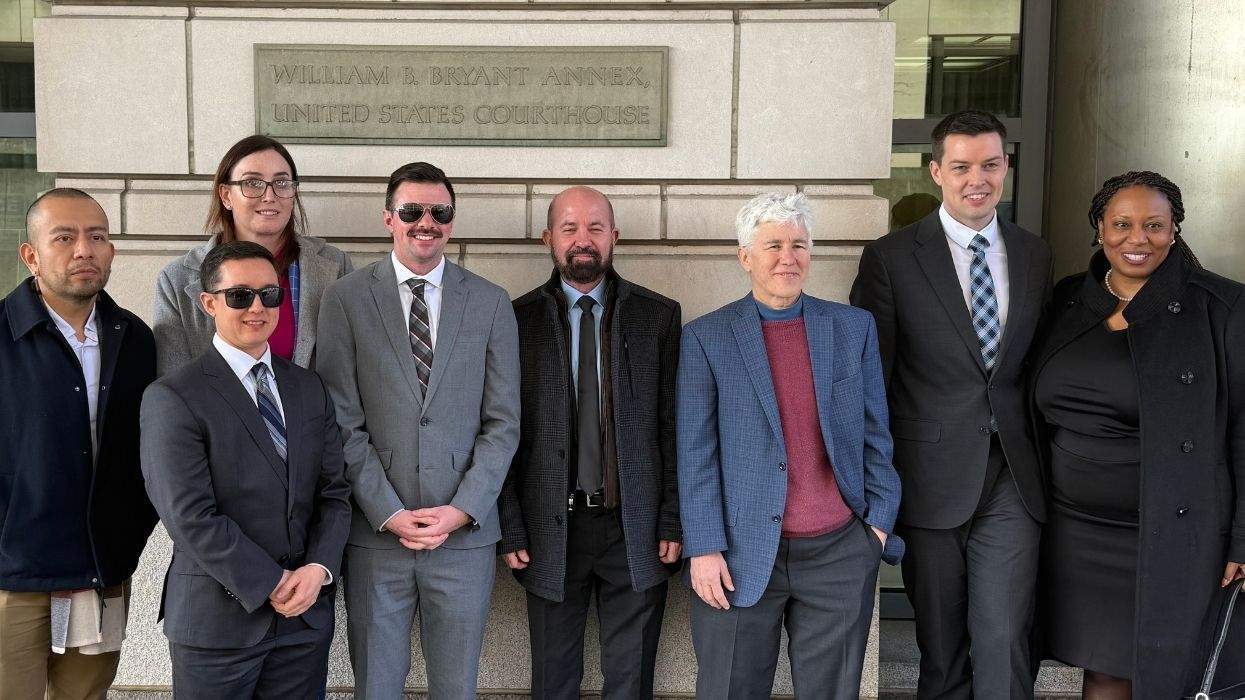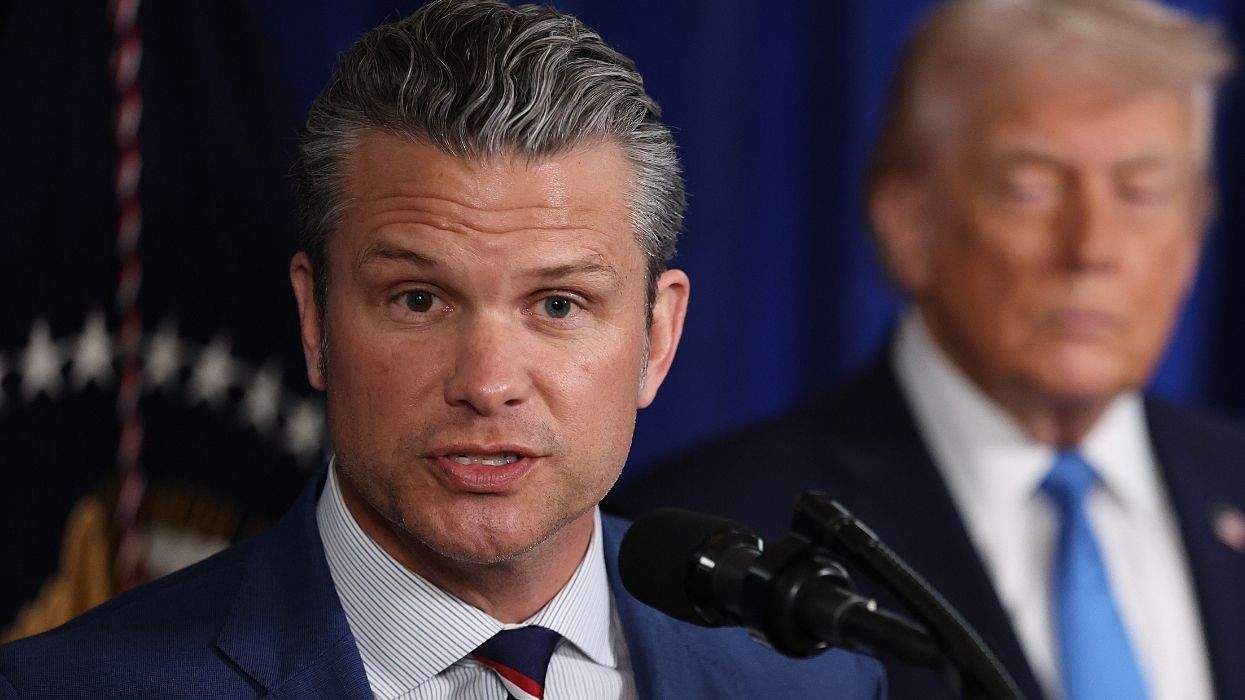This story is part of a series on challenges faced and victories achieved in the fight for LGBT equality. This battle continues, especially with Donald Trump as president, but we won't win unless we learn from the past.
In January 1993, LGBT Americans and their allies were not dreading the inauguration of a new president but instead were excited about it. Bill Clinton, while not the most liberal of Democrats, had campaigned on a gay-friendly platform -- one of his signature promises was to end the ban on gays in the military.
He tried. But as every student of LGBT history knows, he didn't exactly succeed. And how we wound up with "don't ask, don't tell," and how we finally got rid of it, can offer valuable lessons as we face a Donald Trump presidency.
Discrimination against gay, lesbian, and bisexual people -- anyone who engaged in same-sex relations -- had been going on in the U.S. military ever since there was a United States. (The ban on transgender service members was a separate issue.) As far back as the American Revolution, engaging in same-sex acts could get a soldier discharged.
The military often looked the other way in wartime, but its antigay policy was formalized under the Articles of War early in the 20th century and further in 1950, when the Uniform Code of Military Justice set up discharge rules for those who "engage in unnatural carnal copulation" with "another person of the same or opposite sex or with an animal," and further in 1982, the Department of Defense adopted a regulation asserting that "homosexuality is incompatible with military service." This step went a bit further than the others in stating that an LGB identity, not just a certain sex act, was prohibited. Still, many gays, lesbians, and bisexuals served honorably and even heroically from the closet, and fought back in court, often with the help of various organizations, when they were discharged for coming out or being outed.
But Clinton's plan to lift the ban on service by LGB-identified individuals, which he could have done without going through Congress, attracted intense opposition almost immediately. It came from the military brass and from within his own party, especially from Sen. Sam Nunn of Georgia, chairman of the Senate Armed Services Committee. Opponents said the known presence of gay people would harm "morale" and "unit cohesion," and claimed straight soldiers would be horrified at sharing a barracks or shower, let alone a foxhole, with a gay person.
This doomed Clinton's plan, and he had to settle for the compromise of "don't ask, don't tell," a law that allowed gay, lesbian, and bisexual troops to serve, but only if they did not reveal their orientation. And recruiters, commanders, and colleagues were not supposed to ask them.
A key lesson from this is to not underestimate your opponents, says Jon Davidson, legal director at Lambda Legal, which brought many of the court challenges to DADT and the previous policy. "I think Bill Clinton was rather naive about the amount of opposition this was going to face," Davidson says. Clinton, he adds, "was particularly vulnerable because he had not served in the military."
This is a lesson not only for those resisting Trump, but for Trump himself, Davidson notes, and indicates that the new president may not be able to realize some of his more ambitious (or outrageous) plans. "Trump doesn't have the full support even of his own party for some things," he says.
Those who are trying to get Congress to pass or kill a certain piece of legislation, Davidson continues, need allies who lend credibility to their position. "It's important that experts in the field be listened to," he says. In the battle of the ban, those who wanted to maintain it in some form had the experts on their side -- most crucially, experts from within the military.
DADT was supposed to make life better for LGB troops, but it didn't. They had to keep same-sex romantic relationships secret -- or decide not to be in such a relationship. "People had to choose between their love for their country and a full, blossoming relationship," says Matt Thorn, executive director of OutServe-SLDN. "That's a massive sacrifice for people."
And key provisions of DADT were often forgotten. The long form of the law's nickname was "don't ask, don't tell, don't pursue, don't harass," but the military continued to pursue and harass service members seen in a gay bar, rumored to be in a same-sex relationship, or otherwise showing signs of homosexuality. The result was that between 13,000 and 14,000 of them were discharged under the law in the nearly 18 years it was in effect -- February 1994 to September 2011.
Another lesson is to think ahead about the consequences, says Davidson. The Defense Department's 1982 regulation didn't have the force of Congress behind it, but DADT did, so it was more difficult to reverse. President Obama could have suspended discharges under DADT by executive order, but he needed action by Congress to repeal the law. "If you're going to try to undo something, you have to think many steps ahead," Davidson says. "If you don't, you may end up with a statute that makes it harder to change later on."
The factors that spelled the end of DADT were many. "You had these incremental steps over 20 years," says Thorn. There was the work of activist groups founded in its wake, such as Servicemembers Legal Defense Network and OutServe, which eventually merged into OutServe-SLDN, along with long-established groups like Lambda Legal, the American Civil Liberties Union, the Log Cabin Republicans, and the Human Rights Campaign. Those groups with a legal mission brought lawsuits; those with a more political one lobbied Congress.
There were the service members themselves. Grethe Cammermeyer, a military nurse discharged for being lesbian, won reinstatement to the National Guard. The homophobia-fueled murder of Pvt. Barry Winchell in his barracks shocked America. Eric Alva, a gay man, was the first member of the Marine Corps seriously wounded in the Iraq war -- he stepped on a land mine and lost a leg.
Society became increasingly accepting of gay people, and so did the military. And military leaders took notice especially when they realized that DADT was costing them troops with much-need skills, such as knowledge of Arabic.
Then when Barack Obama became president in 2009, he set about repealing DADT, but with support from the military and even from some Republicans. Robert Gates, who continued as secretary of Defense in the Obama administration after having been appointed by President George W. Bush, commissioned a study of the effects of DADT repeal. The study, led by military officials, concluded there would be no problems. Adm. Mike Mullen, who chaired the Joint Chiefs of Staff, also endorsed repeal, as did numerous retired generals, former Defense Secretary William Cohen, former Joint Chiefs Chairman Colin Powell (who had opposed Clinton's plan to lift the ban), and many others.
Even Sam Nunn reversed his opposition, and before Obama took office. He was no longer a senator, but his words had symbolic value. "Society has changed, and the military has changed," he told the Associated Press in 2008.
But they didn't change by themselves. It took people coming out, and it took "constructive collaboration" in politics, says Thorn. "It really comes down to collaboration, open communication," he says. "That's what makes our movement successful." That includes collaboration across party lines, and with people in your own party or movement who may agree broadly with you but differ on certain points, he says.
The result of all this was that in 2010, Congress passed the repeal of DADT and Obama signed it into law; it took effect the following year.
Most activists don't expect Trump to try to reinstate DADT or any kind of ban, including the ban on transgender service members. It was lifted last year by the Defense Department; it was a departmental policy, not a law, so no congressional action was needed. But Ash Carter, the Defense secretary at the time, made sure there was support from within the military for lifting it, just as Obama did with DADT repeal. James Mattis, Trump's nominee for secretary of Defense, has said he's not interested in reinstating either ban.
But communication and collaboration, lining up allies, and not underestimating the opposition are lessons that will likely be useful in opposing other moves by Trump and the Republican-controlled Congress. Among the biggest threats, Davidson says, are repeal of the Affordable Care Act and passage of the First Amendment Defense Act, which would provide a nationwide license to discriminate against LGBT people in the name of religion.
"What I think is critically important right now is educating people, getting people to take action," Davidson says.
Adds Thorn: "We will remain vigilant and watchful. We are going to hold the line. There is no room to roll anything back. We are not going to allow this administration to turn back the clock."















Charlie Kirk DID say stoning gay people was the 'perfect law' — and these other heinous quotes
These are some of his worst comments about LGBTQ+ people made by Charlie Kirk.